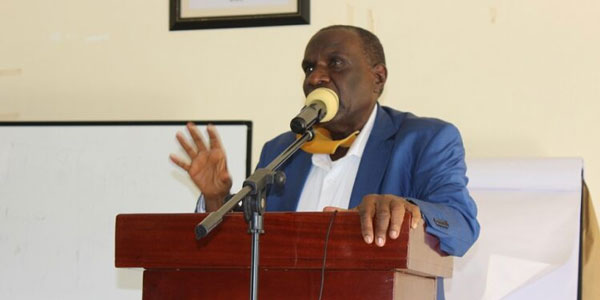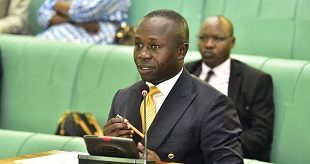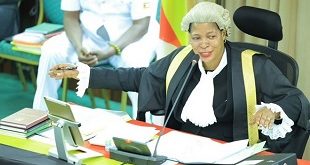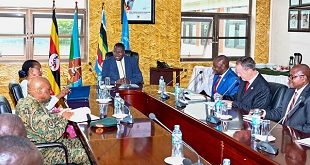
Hoima, Uganda | THE INDEPENDENT | Hajji Yunus Kakande, the Permanent Secretary in the Office of the President, has expressed his concerns over the election of Norman Lukumu, the former Prime Minister of Bunyoro Kitara Kingdom, as the cultural leader of Bugungu (Mutebengwa). Kakande has raised questions about the legality and necessity of this election.
Lukumu was elected as the Bugungu cultural leader last month during a function held at the Oil Land Hotel in Buliisa town council. Alongside him, Thomas Basaswaki was elected as the Clans Council Speaker, and Bonny Mukungi as the deputy.
However, in an interview with Uganda Radio Network, Kakande emphasized the importance of engaging in thorough consultations with the reigning Bunyoro Kitara King, Omukama Solomon Gafabusa Rukirabasaija Agutamba Iguru, before proceeding with any actions related to the Bugungu cultural institution.
Kakande stated that the proponents should respect the authority of the King and seek his approval. Kakande further explained that while the constitution allows certain tribes or people to demand their cultural institutions, the Bagungu should demonstrate respect for the Omukama and involve him in their consultations.
Additionally, Kakande urged the Bugungu cultural institution, agitators, to comply with the recently issued court injunction, which prohibits them from engaging in any activities related to the formation of the Bugungu cultural institution (Obutebengwa).
Earlier this month, the Omukama of the Bunyoro Kitara Kingdom, Dr. Solomon Gafabusa Agutamba Iguru, expressed his disapproval of Norman Lukumu’s election as the cultural leader (Mutebengwa) of Bugungu. Iguru stated that the election was deemed illegal and unnecessary, emphasizing that the Bagungu are an integral part of Bunyoro and should not secede from the Kingdom.
In his address, the King emphasized the significance of unity and peace among his subjects and declared his commitment to preventing any division or disruption within the Kingdom. He expressed concerns that external influences may be behind the push for secession and emphasized that the Kingdom will safeguard its unity.
Iguru called upon all individuals in Bunyoro to work together for the development of the Kingdom and to address important issues such as sharing oil revenue with the central government, promoting education, and enhancing healthcare services. In response, Lukumu described his election as a crucial milestone in the establishment of an independent cultural institution for the Bagungu.
He argued that the Bunyoro Kitara Kingdom has not adequately addressed the concerns of the Bagungu people and has neglected the development of Buliisa district. Lukumu claimed that their culture was at risk of extinction, leading them to pursue the formation of their own cultural institution. According to Lukumu, the people of Bugungu cannot pledge allegiance to the Bunyoro Kitara Kingdom after forming their independent cultural institution.
The proposed secession, which was announced by Lukumu and a group of Bagungu in 2018, has raised concerns among many individuals in the Bunyoro Kitara Kingdom. There are apprehensions that it may impact Bunyoro’s quest for oil royalties, as the majority of oil wells would fall within the jurisdiction of the new Kingdom.
In December of last year, the Ministry of Gender, Labor, and Social Development issued a statement denying clearance for the planned secession of the Bagungu from the Bunyoro Kitara Kingdom.
“This is to inform all concerned that the Ministry of Gender, labor, and social development has not cleared any activities leading to Buliisa cultural revival Association seceding from Bunyoro Kitara Kingdom. We disassociate the ministry staff from any of the consultations being held by the section of leaders from Buliisa on the creation of a separate cultural institution from Bunyoro Kitara Kingdom. The ministry is not and does not intend to cause tension, anxiety, and ethnic division among the Banyoro of Bunyoro Kitara kingdom,” read the letter by the Permanent Secretary to the Bunyoro Kitara Kingdom Premier, Aggrey David Kibenge.
He urged the Buliisa Cultural Association to exhaust the conflict resolution mechanisms provided under the Institution of the Traditional or Cultural Leaders Act 2011. The act states that any conflict or dispute within the traditional or cultural institution or within the community shall be handled by a council of elders or clan leaders or a representative body chosen and approved by the community in accordance with the traditions, customs, and norms of dispute or conflict resolution pertaining to that community. If the community fails to resolve the conflict, the matter is referred to the court.
*******
URN
 The Independent Uganda: You get the Truth we Pay the Price
The Independent Uganda: You get the Truth we Pay the Price


